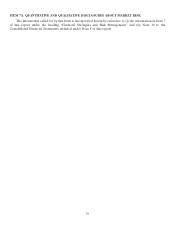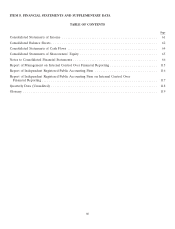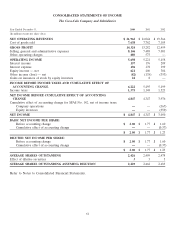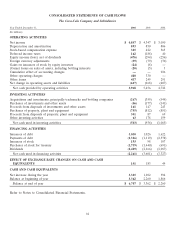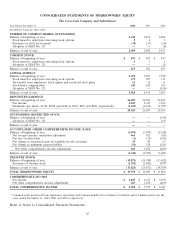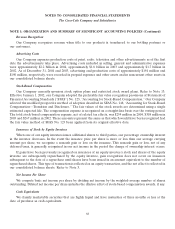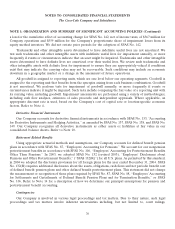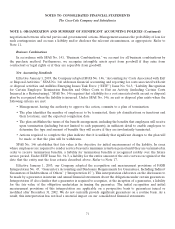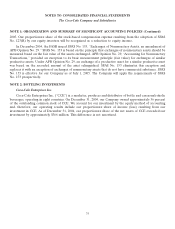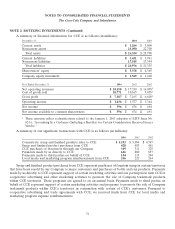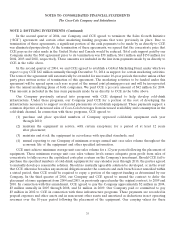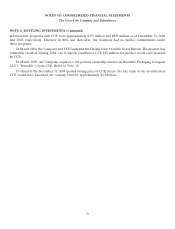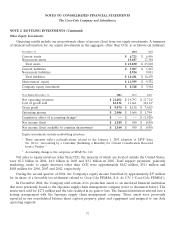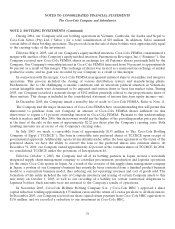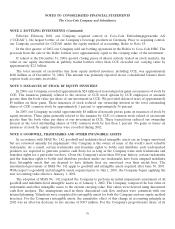Coca Cola 2004 Annual Report Download - page 71
Download and view the complete annual report
Please find page 71 of the 2004 Coca Cola annual report below. You can navigate through the pages in the report by either clicking on the pages listed below, or by using the keyword search tool below to find specific information within the annual report.NOTES TO CONSOLIDATED FINANCIAL STATEMENTS
The Coca-Cola Company and Subsidiaries
NOTE 1: ORGANIZATION AND SUMMARY OF SIGNIFICANT ACCOUNTING POLICIES (Continued)
Trade Accounts Receivable
We record trade accounts receivable at net realizable value. This value includes an appropriate allowance
for estimated uncollectible accounts to reflect any loss anticipated on the trade accounts receivable balances and
charged to the provision for doubtful accounts. We calculate this allowance based on our history of write-offs,
level of past due accounts based on the contractual terms of the receivables and our relationships with and
economic status of our bottling partners and customers.
Inventories
Inventories consist primarily of raw materials, supplies, concentrates and syrups and are valued at the lower
of cost or market. We determine cost on the basis of average cost or first-in, first-out methods.
Recoverability of Equity Method and Cost Method Investments
Management periodically assesses the recoverability of our Company’s equity method and cost method
investments. For publicly traded investments, readily available quoted market prices are an indication of the fair
value of our Company’s investments. For nonpublicly traded investments, if an identified event or change in
circumstances requires an impairment evaluation, management assesses fair value based on valuation
methodologies as appropriate, including discounted cash flows, estimates of sales proceeds and external
appraisals, as appropriate. If an investment is considered to be impaired and the decline in value is other than
temporary, we record an appropriate write-down.
Other Assets
Our Company advances payments to certain customers for marketing to fund future activities intended to
generate profitable volume, and we expense such payments over the applicable period. Advance payments are
also made to certain customers for distribution rights. Additionally, our Company invests in infrastructure
programs with our bottlers that are directed at strengthening our bottling system and increasing unit case
volume. Management periodically evaluates the recoverability of these assets by preparing estimates of sales
volume, the resulting gross profit, cash flows and considering other factors. Costs of these programs are
recorded in prepaid expenses and other assets and noncurrent other assets and are subsequently amortized over
the periods to be directly benefited. Amortization expense for infrastructure programs was approximately
$136 million, $156 million and $176 million, respectively, for the years ended December 31, 2004, 2003 and 2002.
Refer to Note 2.
Property, Plant and Equipment
We state property, plant and equipment at cost and depreciate such assets principally by the straight-line
method over the estimated useful lives of the assets. Management assesses the recoverability of the carrying
amount of property, plant and equipment if certain events or changes occur, such as a significant decrease in
market value of the assets or a significant change in the business conditions in a particular market.
Goodwill, Trademarks and Other Intangible Assets
Effective January 1, 2002, our Company adopted SFAS No. 142, ‘‘Goodwill and Other Intangible Assets.’’
The adoption of SFAS No. 142 required an initial impairment assessment involving a comparison of the fair
value of goodwill, trademarks and other intangible assets to current carrying value. Upon adoption, we recorded
69


